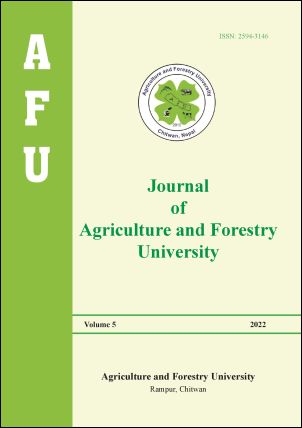Efficacy of biological and chemical insecticides against diamondback moth (Plutella xylostella L.) on Cabbage (Brassica oleracea L. Var capitata)
DOI:
https://doi.org/10.3126/jafu.v5i1.48447Keywords:
Bio-pesticides, cabbage, P. xylostella, management, emamectin benzoate, neemixAbstract
Diamondback moth, Plutella xylostella (L.) is the most devastating pest in late winter in cabbage (Brassica oleracea var. capitata L.). Pesticides are the common pest management practices to manage the crucifer pests. These practices are not sustainable and ecofriendly. Hence, a field experiment was conducted to evaluate the efficacy of chemical, botanicals and biological insecticides to develop safer and more effective insecticides for the diamondback moth, in cabbage during winter season 2018-19. The experiment was laid in a randomized block design (RCBD) with four replication and five treatments viz. i) Emamectin benzoate 5SG @ 0.4 gm/l, ii) Neemix (Azadirachtin 300 ppm) @ 2 ml/l, iii) Metarhizium anisopliae @ 2 ml/l, iv) Beauveri abassiana @ 2 ml/l and v) control (untreated). Standard recommended agronomic practices were followed in field to ensure better crop growth. The maximum reduction of P. xylostella larval population over untreated control was recorded in Emamectin benzoate 5 SG (95%) and Neemix (95%) sprayed field. Bio-pesticides such as M. anisopliae and B. bassiana were effective only after the first spray with maximum efficacy of (76%) and (65%), respectively, and decreased efficacy in the second and third sprays. Both yields with the least number of damaged leaves and maximum net profit was recorded in Emamectin benzoate sprayed plots with a higher benefit-cost ratio of (3.47), which was followed by M. anisopliae (2.96) and Neemix (2.92) treatments, respectively. Emamectin benzoate 5 SG and Neemix are effective and safe insecticides in controlling diamondback moth in cabbage crops and are viable options for integrated management of P. xylostella.
Downloads
Downloads
Published
How to Cite
Issue
Section
License
Copyright (c) 2022 Agriculture and Forestry University (AFU), Rampur, Chitwan, Nepal

This work is licensed under a Creative Commons Attribution-NonCommercial 4.0 International License.
This license allows reusers to distribute, remix, adapt, and build upon the material in any medium or format for noncommercial purposes only, and only so long as attribution is given to the creator.




